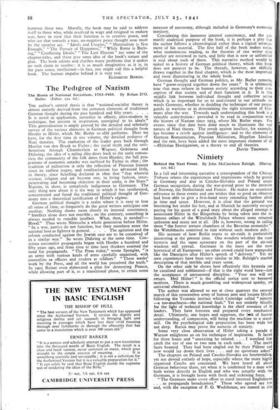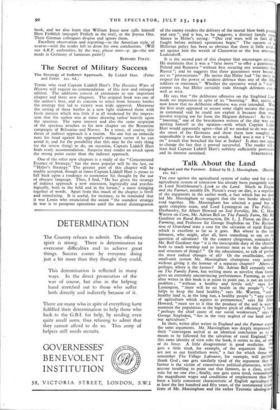Nimiety
Behind the Nazi Front. By John McCutcheon Raleigh. (Harrap los. 6d.)
IN a full and interesting narrative a correspondent of the Chicagc Tribune relates the experiences and impressions which he gained in Germany and also in Czecho-Slovakia and Poland under German occupation during the war-period prior to the invasion of Norway, the Netherlands and France. He makes an occasional reference to these events and one wishes that so good an observer had been able to give a first-hand story extending further afield in time and space. However, it is clear that the ground was becoming hot under his feet, and at Munich he narrowly escaped paying for his quest of a good story about the alleged attempt te assassinate Hitler in the Biirgerbrau by being taken into the in- famous cellars of the Wittelsbach Palace whence none returned unbeaten and many not at all. (He is, however, wrong in calling them "the former torture chambers of the Bavarian monarchs": the Wittelsbachs contrived to rule without such modern aids.) His account of how Berlin reacts to air-raids is particularly interesting at the present time. One wonders whether the same hysteria and the same autocracy on the part of the air-raid wardens still prevail. Germans in the mass are the most hysterical of all Europeans: no other crowd could have stampeded like the Danzigers after Hitler's speech of "delivery." Yet my own experiences have been very similar to Mr. Raleigh's startled description of that terrible and crazy scene.
On the other side he shows how effectively this hysteria can be canalised and sublimated—if that is the right word here—into the acceptance of unreasoned discipline. "Your son will not return. Heil Hitler! " is the official notice sent to bereaved mothers. There is much grumbling and widespread apathy, yet universal obedience.
The author was allowed to see at close quarters the onward march of this remorseless army of human ants and locusts blindly following the Teutonic instinct which Coleridge called " nimiety —a too-muchness—the national fault." Yet not entirely blindly, for the light of technical knowledge is the chief resource of in leaders. They have foreseen and prepared every mechanical detail. Ultimately, one hopes and supposes, the lack of human understanding, of compassion, will bring the machine to a stand- still. On the psychological side preparation has been wide but not deep. Russia may prove the nemesis of nimiety.
Some very close observation of Hitler taking a parade at Warsaw enlightens us on his technique of inspiration. It lasted
for three hours and "unceasing he saluted. . . . I watched hint catch the eye of one or two men in each rank. . . The men's faces beamed. They had been singled out by their Fiihrer and now would lay down their lives . . . and no questions asked." The chapters on Poland and Czecho-Slovakia are heartrending, yet not devoid entirely of hope, especially where the more highly
organised Czechs are concerned. We have heard all about German behaviour there' yet when it is confirmed by a man who both writes directly in English and who was actually with the Germans, it is brought home with fresh and sickening force.
"The Germans make every effort to enrol interned Englishmen . . . as propaganda broadcasters." Those who agreed are few and, with the exception of P. G. Wodehouse, are named in this book, and we also learn that William Joyce now calls himself Herr FrOhlich (misspelt Frolich in the text), or the Joyous One. Their German colleagues despise and ignore them.
Excellent observation and reporting—in the American style, of course—with the reader left to draw his own conclusions. (Will our A.R.P. authorities, by the way, please note—p. 39—the use made in Germany of luminous paint?)
BERNARD FOLEY.



























 Previous page
Previous page